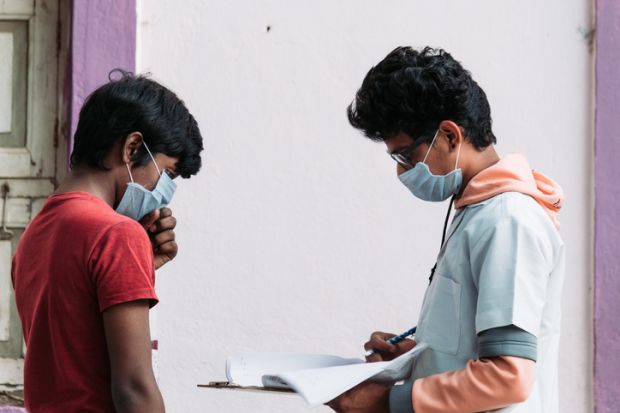The rising number of Covid-19 infections in India – the second highest in the world after the United States – has shone a spotlight on the need to improve medical education and to ensure a steady flow of high-quality professionals into the field.
The issue was highlighted this weekend as results from one medical exam for foreign-trained doctors came back with a dismal pass rate, while another medical entrance exam went ahead despite safety concerns.
The National Testing Agency (NTA) announced on 12 September that less than 10 per cent of test takers passed the Foreign Medical Graduates Examination (FMGE), which is required of returnee doctors from China, eastern Europe, South-east Asia and the Caribbean but not of graduates from medical schools in India, the US, the UK, Canada, Australia or New Zealand.
Criticisms of the FMGE’s restrictive nature have been amplified during the pandemic. The All India Foreign Medical Graduates Association has been urging the government since March to exempt foreign graduates, so they could provide immediate help to hospitals.
Also over the weekend, more than 1.5 million Indian high school seniors donned masks and gloves to take the National Eligibility cum Entrance Test (NEET) for medical school admissions. The pen-and-paper assessment, available in 11 languages, proceeded on 13 September after having been delayed twice. The NTA said that between 85 and 90 per cent of registrants attended.
In a country that has struggled for months to conduct exams safely, the holding of NEET – as well as an engineering admissions exam, the Joint Entrance Examination (JEE) – was lauded as a boon for the government. Ramesh Pokhriyal Nishank, the education minister, tweeted that “NEET participation reflects the tenancy and grit of young Atmanirbhar Bharat”, using a term that refers to a self-reliant India.
Rama Baru, a professor at the Centre of Social Medicine and Community Health at Jawaharlal Nehru University, told Times Higher Education that holding NEET in such conditions was “more a project to normalise the post-Covid situation”, and that some students may have attended the exam “under pressure”.
“It’s natural for young people to feel anxious about the future,” she said. “The lockdown was a huge disruption to teaching and learning at all levels. And now suddenly, the government is expecting things to seem back to normal.”
As for the FMGE’s low pass rate, Professor Baru commented that “it’s a very tough exam” and “not a level playing field”.
She recommended that India hold exit exams for all medical students wanting to practise, regardless of where they graduate.
“If we hold these exams for some foreign graduates, why not for everyone?” she asked. “This is a serious issue, especially when you have a fairly large cohort of medical students who come back to India and cannot practise.”
Overseas Indian medical students traditionally ended up in Western countries, but in the past few years, more have opted for other nations in the developing world.
Of the 23,000 Indian students in China, 21,000 were studying medicine, according to 2019 data by the Indian Ministry of Education. There are also increasing numbers of Indian medical students in Russia, eastern Europe and South-east Asian nations such as the Philippines.
The cost of medical studies in these countries can sometimes be lower than at some private institutions back home. The Indian government has also made recent moves to ensure the quality of those outgoing students, for example by requiring passing NEET marks for Indian medical students heading to China.
Professor Baru said that medical education was only one consideration in improving the sector. “We always say there is a shortage of doctors, but there is also unemployment among doctors, or a poor absorption of doctors in different regions in India,” she said.
Register to continue
Why register?
- Registration is free and only takes a moment
- Once registered, you can read 3 articles a month
- Sign up for our newsletter
Subscribe
Or subscribe for unlimited access to:
- Unlimited access to news, views, insights & reviews
- Digital editions
- Digital access to THE’s university and college rankings analysis
Already registered or a current subscriber? Login







